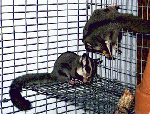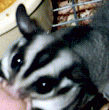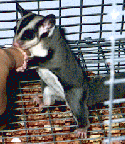|
Scents
NOTE: If your gliders smell bad there may be a problem with their diet. If you overfeed them vitamin supplements, for example, their urine will develop a very strong odor and even daily scrubbing of their cage and all accessories won't keep it under control. Try cutting out all vitamin supplements completely; the smell should disappear within a couple of days. Then add the supplements back gradually until you determine how much you can give without making them smell bad. Male sugar gliders have a scent gland in the middle of the top of their head, which causes the typical bald spot in the center of the wide part of the black stripe there. Another gland is located in the middle of their chest. A third gland, an anal one, is shared by males and females alike. The females also have a scent gland in their pouch.
Gliders use urine to mark their territory, so you will need to clean their cages and furnishings periodically. Otherwise though, they are very clean little animals. See the housing section for more on the topic of cages.
|



